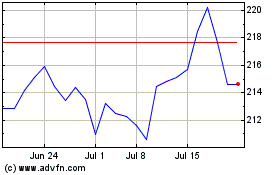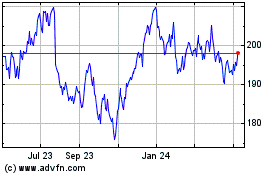By Sara Castellanos
Industrial conglomerate Honeywell International Inc. said
Tuesday that it plans to introduce an early-stage quantum computer
for commercial experiments within about three months, with JPMorgan
Chase & Co. as the first public user.
A Honeywell executive said the machine is set to be the world's
most powerful quantum computer by one measure, as it vies for a
leading position in the nascent quantum-computing market against
technology giants such as International Business Machines Corp.,
Alphabet Inc.'s Google and Microsoft Corp.
Tony Uttley, president of Honeywell Quantum Solutions, said the
technology will be used by companies interested in significantly
speeding up calculations and developing new materials and new
trading strategies for financial services. The technology could
also speed up calculations that involve machine learning, for use
by industries such as aerospace and oil and gas. Honeywell already
develops technology for those sectors.
"We believe that quantum computing is going to profoundly impact
a number of industries," Mr. Uttley said.
Honeywell has also recently made undisclosed investments in
quantum-computing software companies Cambridge Quantum Computing
Ltd., based in the U.K., and Boston-based Zapata Computing Inc.,
Mr. Uttley said.
By harnessing the properties of quantum physics, quantum
computers have the potential to sort through a vast number of
possibilities in nearly real time and come up with a probable
solution. While traditional computers store information as either
zeros or ones, quantum computers use quantum bits, or qubits, which
represent and store information as both zeros and ones
simultaneously. No commercial-grade quantum computer has been built
yet.
By 2023, a fifth of organizations, including businesses and
governments, are expected to budget for quantum-computing projects,
up from less than 1% in 2018, according to research and advisory
firm Gartner Inc.
Mr. Uttley said Honeywell expects its machine to be "the world's
most powerful quantum computer," based on an expected quantum
volume of at least 64. The computer's current quantum volume is 16.
IBM in January said its quantum computer had a quantum volume of
32.
Quantum volume determines how powerful a quantum system can be.
It takes into account how complex an algorithm a quantum computer
can implement before decoherence affects the results, said Matthew
Brisse, a Gartner analyst who covers quantum computing. Decoherence
refers to changes in temperature, noise, frequency and motion that
can hurt the accuracy of a calculation or prevent it from being
completed.
Quantum volume was first defined by IBM and there are no
universally accepted industry standards for measuring
quantum-computing performance, according to Mr. Brisse. It's an
"interpretation of how they measure their quantum systems," he
said.
Honeywell's machine is based on a method that uses trapped ions.
Mr. Uttley said this method makes for more accurate calculations
compared to other techniques because it allows for the quantum bits
to be controlled more accurately while mitigating potential
errors.
The trapped-ion method is also used by venture-backed startup
IonQ Inc. It differs from a common approach to quantum computing,
practiced by early adopters such as Google and IBM, which is to
manufacture superconducting qubits that are extremely delicate and
need to be supercooled to create quantum mechanical effects.
Honeywell, based in Charlotte, N.C., began work about a decade
ago on the underlying technology for quantum computers, Mr. Uttley
said. The company's quantum-computing team is made up of more than
100 people, including scientists, engineers, coders and
technicians.
Marco Pistoia, managing director and global technology head of
applied research and engineering at JPMorgan Chase, said
Honeywell's quantum computer is revolutionary in that it has been
able to reduce its error rate and increase the stability of its
qubits by using trapped ions. "They're releasing a computer that's
extremely powerful," he said.
Mr. Pistoia declined to disclose whether JPMorgan is a paying
customer of Honeywell's quantum computing services. JPMorgan
intends to continue experimenting with a quantum computer built by
IBM, a partnership that began in late 2017.
The JPMorgan executive said he expects to use quantum computing
to speed up computing-intensive calculations. Such calculations
include Monte Carlo simulations, which are commonly used to
calculate the theoretical value of an option, or a contract that
gives individuals the right to buy or sell an underlying asset at a
specific price and time.
Quantum computing could also be used in portfolio optimization,
where the firm would want to select the best asset distribution
while maximizing expected returns and minimizing costs and
financial risks.
"These are all problems that when you look at them classically
they have very high complexity, so they lend themselves very
naturally to quantum computing," said Mr. Pistoia, who joined
JPMorgan in January. He previously spent 24 years at IBM, where he
was a distinguished research staff member and senior manager of
quantum computing.
JPMorgan could also use the technology to detect fraud, because
quantum computers can potentially take into account vastly more
data points than traditional computers, including a mix of
fraudulent and nonfraudulent data. This means a quantum computer
could potentially use machine algorithms on imbalanced data, where
fraudulent data represents a tiny fraction of a data set.
Write to Sara Castellanos at sara.castellanos@wsj.com
(END) Dow Jones Newswires
March 03, 2020 05:14 ET (10:14 GMT)
Copyright (c) 2020 Dow Jones & Company, Inc.
Honeywell (NASDAQ:HON)
Historical Stock Chart
From Dec 2024 to Jan 2025

Honeywell (NASDAQ:HON)
Historical Stock Chart
From Jan 2024 to Jan 2025
